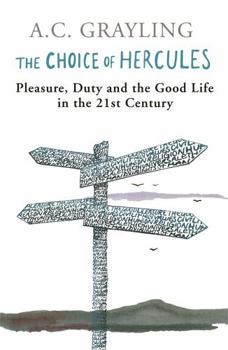The Choice of Hercules
Select Format
Select Condition 
Book Overview
Duty or Pleasure? This was the legendary choice which faced Hercules and which pre-eminent philosopher A.C. Grayling uses as the starting point of this masterful book.
Format:Paperback
Language:English
ISBN:0753824434
ISBN13:9780753824436
Release Date:April 2009
Publisher:Phoenix
Length:192 Pages
Weight:0.40 lbs.
Dimensions:0.7" x 5.1" x 7.7"
Customer Reviews
3 ratings
Moral and Ethical Philosophy in Elegant Simple Style
Published by Thriftbooks.com User , 15 years ago
A. C. Grayling is no intellectual slouch, and no one should mistake his spate of "accessible philosophy" publications as simply "pop philosophy." He is a serious academic and philosopher, but his recent plethora of publications addresses subjects in "bite size," easy to digest and understand, still serious, thinking. This is one of his better efforts, since it deals with the notions of value (axiology), the "good," good/bad judgments, duty, obligations, some ethics, and little Kant or consequentialism -- largely discredited and of historical interest only. Both Hume and Smith are included (too brief, IMHO), and Smith's "analogous emotion" and "impartial spectator" metaphors could have been used to great effect at Grayling's amble prose. If nothing else, Grayling asks you to THINK CRITICALLY. That he achieves reasons for doing so makes this a home-run.
Grayling at his best...a provocative and accessible work.
Published by Thriftbooks.com User , 15 years ago
Urbane without being stuffy, practical without being pedantic, and rooted in classicism without smelling musty. A fine work of philosophical musing with a pragmatic thrust. Using the choice presented to Hercules between (loosely) a pleasureable life and a worthwhile life as his point of departure, Grayling tackles a host of vexing and intriguing issues, from personal meaning to societal ills. Perhaps the observation Grayling makes that stands out the most to me after putting down this brief, punchy work is that while our morals have in many ways improved over the past century or more, our civility seems to have gone into decline. I can't help thinking that if more people took to heart the central themes of "Hercule," that problem could be brought largely in check. We would feel more personally empowered, and more in tune to the needs and rights of others. Not a small thing in a crowded, vulnerable, and sometimes hostile world.
Have a Good Life and Enjoy it
Published by Thriftbooks.com User , 16 years ago
This short (172 pages) book is a deeply provocative book that examines the conventional ways in which we regard pleasure and duty. People who lead a virtuous and morally upright life often suspect that pleasures have hedonistic elements that betray virtue and morality, whereas, duty has stoic qualities and often promises numbness at best; and renunciation and pain at worst. Grayling invites the reader to re-examine the traditional ways of thinking about pleasure and duty; to see them from other perspectives; not, for example, to see pleasures as "traps and snares, portals through which evil comes", and that the good life can be both a pleasure and a Good. Grayling points out that concerns about sex, drugs, gay marriages and all the matters that daily "agitate the moral majority in America and Britain pale into triviality" against the truly big moral issues that arise in the context of human rights, genocide, third world poverty, and arms trade. He also attends to the tender questions concerning death and dying. he draws a distinction between 'death' as a state and 'dying' as an act, so as to expose the fallacy of conflating the two in order to promote the supercificially attractive ditty, "Death is the antithesis of life", that has even found its way into a judgment from the House of Lords in Britain. Moral conduct in the context of religion is also examined in an analysis that marks morality as a virtue in itself rather than the dictate of some supernatural being. The last part of the book deals with the big moral issues that seems so difficult and intractable for the individual moral agent to do anything significant. Perhaps the hint of Herculean powers in all of us was the author's way of inspiring hope in all of us. Grayling ends thus: "the life best worth living is the informed life, the considered life, the responsible life, the chosen life, in which sound the notes that together, in harmony, make for fulfilment in the active sense of well-being and well-doing that Aristotle nominated as the mark of moral success. It might be Herculean labour at times to achieve this success; but the choice any would-be Hercules of the good life should make, is at least to try: for it is the endeavour itself which is the greatest part of the good."





